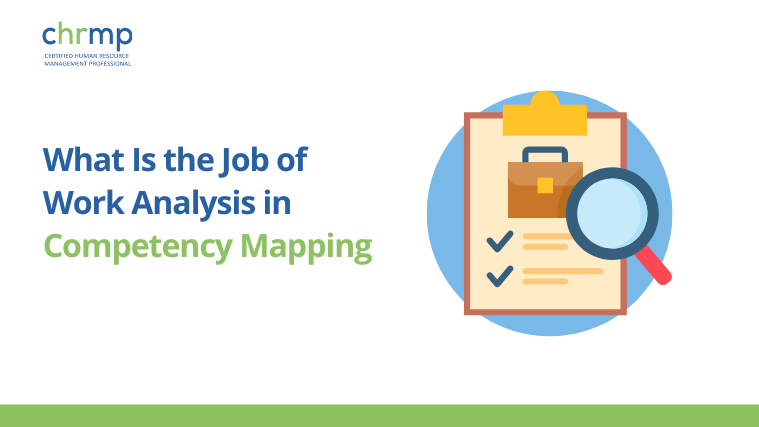
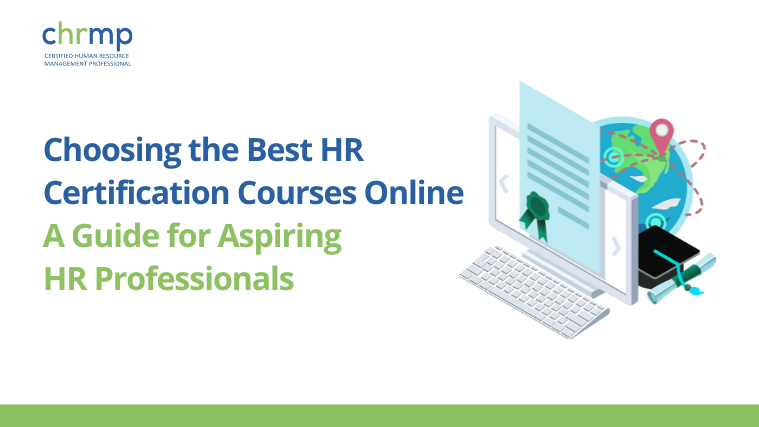
In today’s competitive job market, HR professionals must continually upgrade their skills to stay relevant. With the increasing complexity of workforce management, compliance regulations, and technology integration, certifications have become essential for career growth. This guide will help you navigate the best HR certification courses online, addressing key industry challenges and offering insights into their benefits. We will cover:
By the end of this guide, you will have a clear roadmap for selecting the most suitable HR certification to enhance your expertise, boost your earning potential, and accelerate career growth.
To thrive in HR, professionals must tackle numerous industry challenges, from managing global teams to staying ahead of compliance changes. Certifications offer a structured way to overcome these hurdles, equipping HR professionals with the skills needed for success. In the following sections, we’ll explore some of the most pressing pain points HR professionals face today and how the right certification can help mitigate these issues.
1.1 Managing Global Teams
With businesses expanding beyond borders and remote work becoming the norm, HR professionals are now expected to manage global teams effectively. This requires a deep understanding of cross-cultural communication, workforce diversity, and international labor laws. However, many HR leaders struggle to bridge these gaps, leading to inefficiencies and misalignment within teams. A strong understanding of cross-cultural communication and international workforce strategies is crucial, yet often lacking in traditional HR training. The following statistics highlight the extent of these challenges:
1.2 Modern Performance Management
Traditional performance management models are losing relevance in today’s dynamic workplace. Annual reviews and rigid evaluation structures fail to provide real-time feedback, making it difficult to align employee goals with organizational objectives. Many companies are shifting towards continuous performance monitoring, but HR professionals often lack the necessary frameworks to implement these changes effectively. The following statistics underscore this issue:
1.3 Rising Recruitment Scams
The rise of digital recruitment has brought new challenges, including fraudulent hiring schemes and identity theft. Candidates and organizations alike face risks from unverified job postings, fake credentials, and financial fraud. HR professionals must implement robust verification systems to mitigate these risks, yet many lack proper training in fraud detection. Here’s the scope of the problem:
1.4 Salary Stagnation and Career Progression
Many HR professionals struggle to break through salary ceilings due to a lack of specialized skills or certifications. Without additional credentials, career progression can be slow, leaving professionals feeling stuck in mid-level roles. Industry data reflects this trend:
1.5 Compliance and Legal Challenges
Employment laws and workplace regulations evolve rapidly, and HR professionals must stay updated to ensure compliance. Failure to do so can result in costly legal battles and reputational damage. Despite this, many HR teams struggle to keep pace with ever-changing labor laws. The data speaks for itself:
1.6 Data-Driven HR Decision Making
HR departments are increasingly expected to leverage data for strategic decision-making, yet many professionals lack the analytical skills required to interpret and act on workforce data. Companies that integrate analytics into HR practices report better hiring, retention, and workforce planning outcomes. However, proficiency in HR analytics remains low, as shown in these findings:
1.7 Employee Well-Being and Retention
Employee satisfaction and well-being are directly linked to productivity and retention, but many organizations fail to implement effective engagement strategies. A lack of career development opportunities and poor workplace culture contribute to high turnover rates. Here’s why HR must prioritize retention strategies:
1.8 Diversity, Equity, and Inclusion (DEI) Challenges
Despite growing awareness of the importance of DEI, many organizations struggle to implement effective diversity and inclusion strategies. HR professionals often lack formal training in DEI principles, which can hinder progress in creating an inclusive workplace. These statistics highlight the gap:
1.9 Technology Adaptation in HR
HR technology is evolving rapidly, from AI-driven recruitment tools to automated payroll systems. While these advancements enhance efficiency, many HR professionals struggle with implementation due to a lack of technical expertise. Organizations expect HR teams to be proficient in emerging technologies, but the reality is different:
1.10 Talent Acquisition and Employer Branding
Attracting top talent has become more challenging in a competitive job market. Companies with weak employer branding struggle to appeal to high-quality candidates, and HR professionals must develop strong recruitment marketing skills to build a compelling employer brand. Here’s why this issue matters:
Overcoming these challenges requires a proactive approach to learning and professional development. Some of the most effective strategies include:
While these methods provide valuable insights, structured learning through certifications offers a more comprehensive and industry-recognized approach to skill development. In this blog, we will focus on how certifications can help professionals address these pain points effectively.
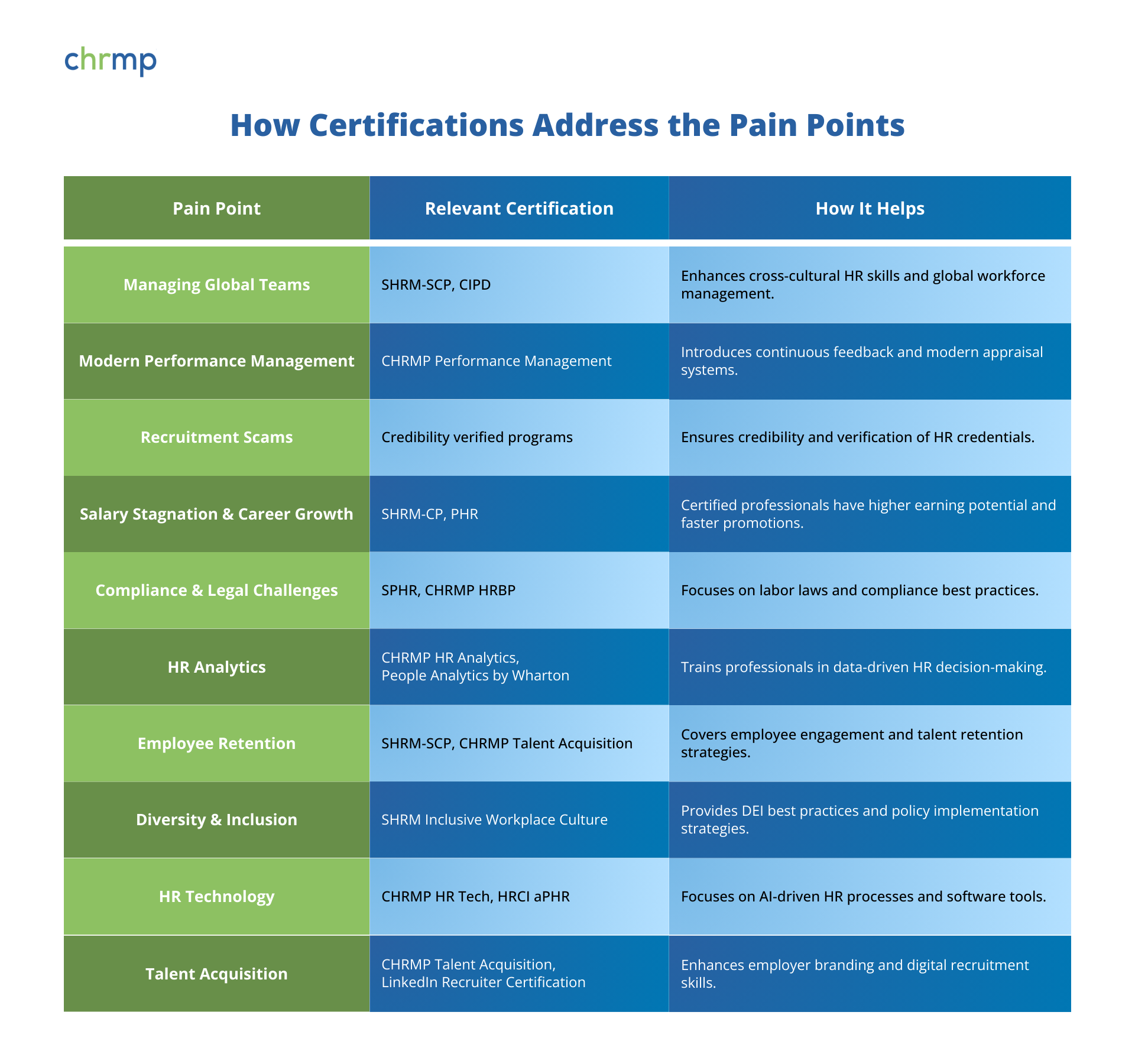 3. Major Certifications Comparison
3. Major Certifications ComparisonThere are several HR certification programs available, each catering to different experience levels, geographic focus, and specializations. Below is a indicative comparison of various programs:
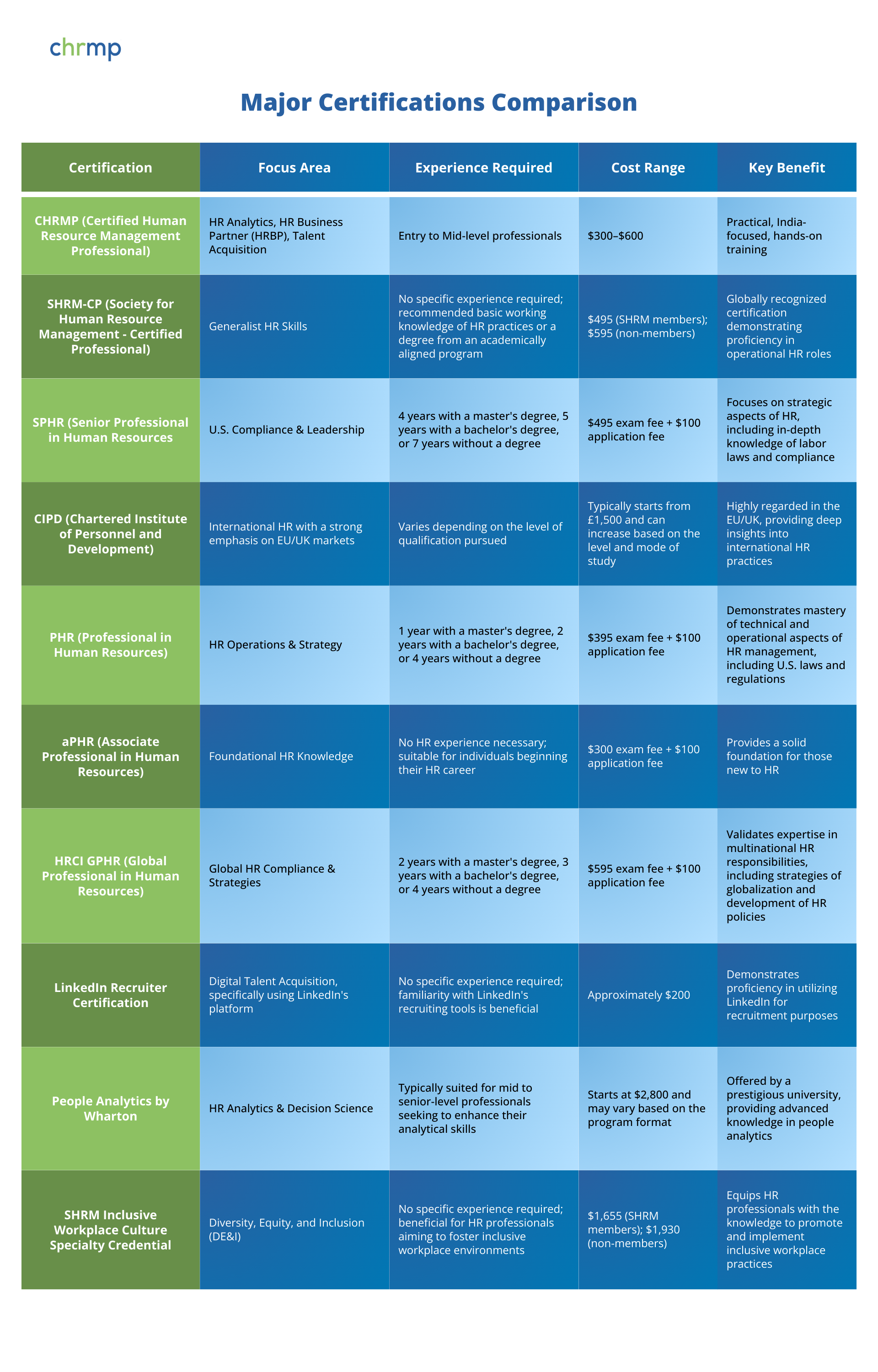
Note: Costs and experience requirements are subject to change. It’s advisable to consult the official certification bodies for the most current information. This is not an exhaustive list and readers are advised to search for latest information with respective certifying bodies.
Selecting the best HR certification requires careful consideration of several factors. Follow these key steps to ensure the certification aligns with your career goals and maximizes your return on investment. Throughout this guide, we have included examples to illustrate different scenarios, helping you understand how various HR certifications can apply to different career paths and industry requirements.
3.1 Self-Assessment: Understanding Your Career Goals
Example: Sarah, an HR coordinator with two years of experience, is looking to transition into a data-driven HR role. She assesses her interests and finds HR analytics appealing. After researching, she discovers that the CHRMP HR Analytics certification and People Analytics by Wharton are highly recommended for professionals aiming to develop expertise in workforce data analysis. Based on her career goals and budget, she chooses CHRMP HR Analytics as a cost-effective and industry-recognized option.
3.2 Market Demand: Evaluating Industry Needs
Example: David, an HR professional in the healthcare industry, wants to advance his career and increase his credibility. He researches job postings for HR roles in hospitals and medical facilities and finds that many employers prefer candidates with the Certified in Healthcare Human Resources (CHHR) certification. Recognizing that this certification aligns with his industry and career goals, he decides to pursue it, ensuring he remains competitive in the healthcare HR market.
3.3 Budget & ROI: Weighing Costs vs. Benefits
Example: Lisa, a mid-career HR professional, wants to boost her earning potential by obtaining a globally recognized certification. She compares the costs of CHRMP ($300–$600) and SHRM-CP ($900–$1,500) and finds that CHRMP offers a more affordable and flexible option with specialized modules in HR Analytics and Talent Acquisition. After calculating the potential salary increase of 31.6% and checking if her employer offers tuition reimbursement, she decides to invest in CHRMP, knowing that its practical, industry-focused approach will help her secure a promotion and increase her earning potential.
3.4 Credibility Checks: Verifying Accreditation
Example: Michael, an HR specialist, is considering enrolling in an online HR certification but is unsure about its credibility. He checks the certification provider’s website and finds that it lacks industry accreditation and third-party verification. After further research, he discovers that CHRMP conducts its examinations through Mettl and Prometric, ensuring a rigorous and standardized assessment process. He chooses CHRMP over the unverified option, ensuring that his certification will be respected by employers and add real value to his career.
3.5 Post-Certification Value: Networking & Career Growth
Example: Emma, a senior HR professional, recently completed her SHRM-SCP certification. She gains access to SHRM’s vast network of over 300,000 HR professionals worldwide, allowing her to connect with industry leaders and mentors. Meanwhile, John, an early-career HR professional, chooses AIHR’s certification because of its strong online learning community and continuous skill development resources. Similarly, Priya, an HRBP in India, opts for CHRMP as it offers mentorship programs tailored to practical HR challenges. By selecting certifications with strong post-certification support, each of them maximizes their career growth potential.
As HR professionals navigate the landscape of certifications, it’s crucial to consider factors beyond just choosing the right program. Maintaining certification status, ensuring the credibility of instructors, and staying updated with recertification requirements can significantly impact long-term career growth. This section explores these key considerations to help HR professionals make informed decisions and maximize the value of their certifications.
4.1 Recertification Requirements: Staying Certified
Earning an HR certification is just the beginning; maintaining it is equally important. Many certifications require periodic renewal to ensure professionals stay updated with industry trends, regulatory changes, and evolving best practices. Recertification typically involves earning continuing education credits, attending professional development activities, or retaking exams. Understanding these requirements in advance helps HR professionals plan their career growth effectively and avoid lapses in certification status. Let’s explore the recertification requirements for various HR credentials and how to stay compliant with them.
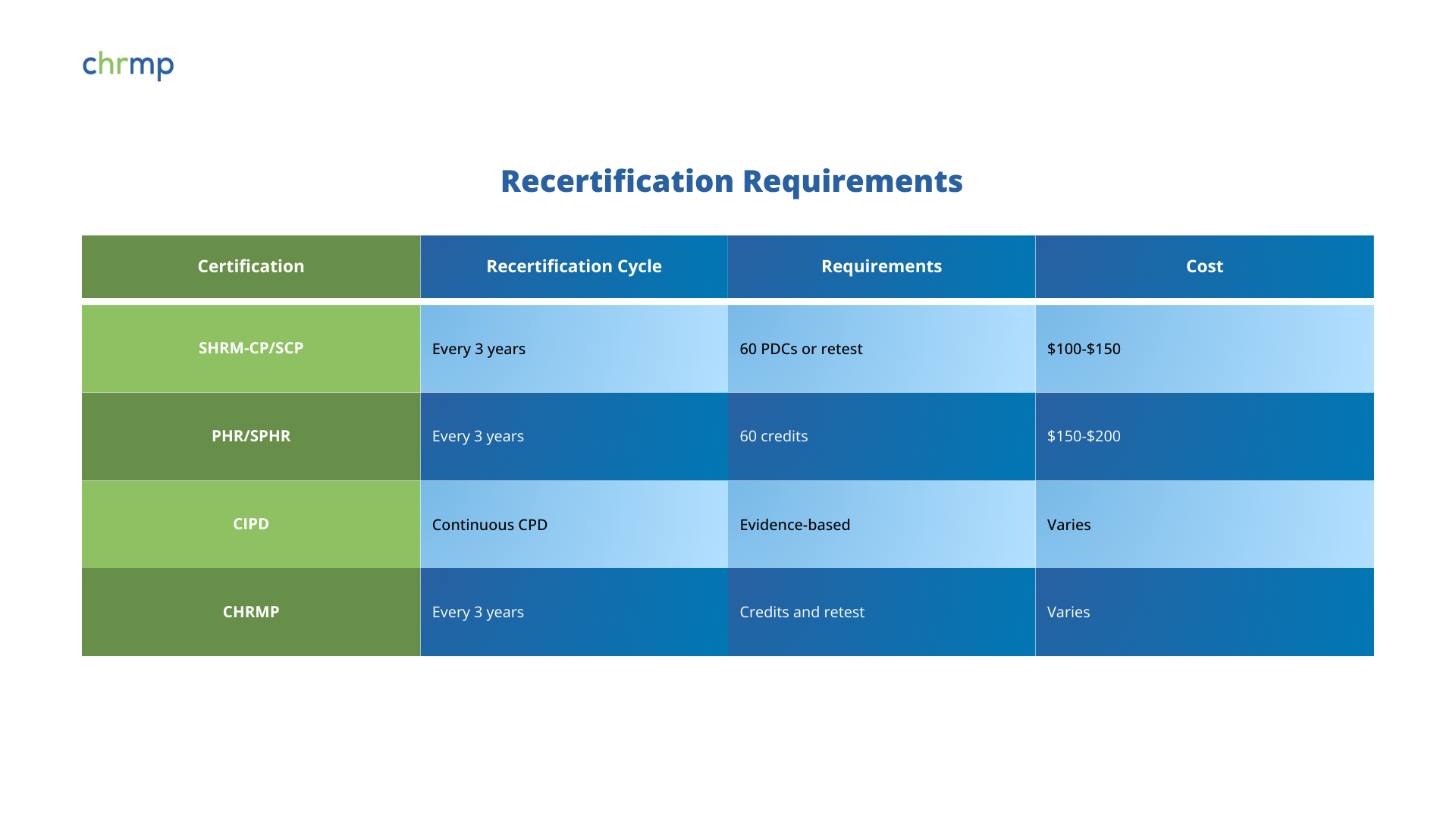
4.2 Instructor Quality: Learning from the Best
When selecting a certification, it is essential to consider the expertise of the instructors, as they play a crucial role in delivering industry-relevant knowledge. A well-qualified faculty ensures that learners receive practical insights and real-world applications of HR concepts. Programs like AIHR offer courses led by global HR experts with academic and consulting backgrounds, while CHRMP emphasizes instruction from seasoned HR practitioners with hands-on experience. Similarly, SHRM and CIPD leverage faculty with extensive corporate HR expertise, ensuring learners are equipped with strategic and operational HR skills. Evaluating instructor credentials and their industry experience helps professionals choose certifications that provide meaningful and applicable learning outcomes.
Choosing the right HR certification is a strategic decision that can significantly impact your career trajectory. By understanding the challenges in the HR landscape, evaluating different certification options, and considering factors like budget, credibility, and post-certification value, you can make an informed choice that aligns with your career goals.
Whether you are an aspiring HR professional looking to establish credibility or an experienced practitioner aiming to specialize, the right certification can open doors to new opportunities and professional growth. Invest in continuous learning, leverage networking opportunities, and stay updated with industry trends to remain competitive in the evolving HR field.
If you’re ready to take the next step, explore different certification programs, compare their benefits, and choose the one that best fits your aspirations. Start your journey today and position yourself for long-term success in the HR industry!
Exclusive Free Resources to Support Your HR Certification Journey
To help you make an informed decision about HR certifications, explore these valuable free resources available from CHRMP:
✅ CHRMP Certification Handbook – A structured guide to understanding CHRMP certifications, their benefits, and how they align with various HR career paths.
✅ Free Preview Lessons – Get access to free lessons from CHRMP courses to experience the curriculum before enrolling.
✅ CHRMP Mentorship Program – Connect with experienced HR professionals who can provide career guidance and industry insights.
By leveraging these free resources, you can gain clarity on your certification options, experience CHRMP’s training approach, and take confident steps toward advancing your HR career.
Explore CHRMP Certifications and Begin Your HR Journey Today!

© 2007-2025 CHRMP| All Rights Reserved | Powered by Ripples Learning & Research Private Limited
